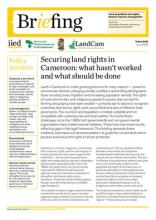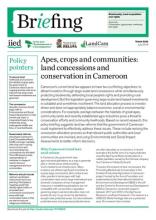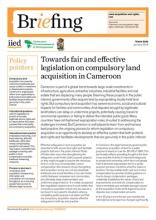Land Library
Welcome to the Land Portal Library. Explore our vast collection of open-access resources (over 74,000) including reports, journal articles, research papers, peer-reviewed publications, legal documents, videos and much more.
/ library resources
Showing items 1 through 9 of 81.Au cours des trente dernières années, un nombre croissant d'États ont adopté de bonnes lois qui renforcent considérablement les droits fonciers de leurs citoyens.
Land in Cameroon is under growing pressure for many reasons — powerful commercial interests, changing climate conditions and shifting demographic flows including mass migration and increasing population density.
Cameroon’s current land law appears to have two conflicting objectives: to attract investors through large-scale land concessions while simultaneously protecting biodiversity, defending local people’s rights and promoting rural development.
From the mid-2000s, a commodity boom underpinned a wave of land use investments in low- and middle-income countries.
Cameroon is part of a global trend towards large-scale investments in infrastructure, agriculture, extractive industries, industrial facilities and real estate that are displacing many people.
A discussion paper on civil society's participation in land policy-making, focused on the pre-consultation phase of Myanmar's National Land Use Policy. Written by Eben Forbes, with research assistance from Dr. Nu Nu Khin and
This study presents a country-wide quantitative analysis of the Parliamentary Land Investigation Commission reports that were released to the public. The aim is not just to analyze the information contained in the reports, but also to elicit information they do not reveal.
The Mekong Region Land Governance (MRLG) project and the Forestry Department of the Ministry of Natural Resources and Environmental Conservation (MONREC) co-hosted the “Mekong Region Customary Tenure Workshop” on 7-9 March 2017 in Nay Pyi Taw, Myanmar.
A discussion note from Mekong Region Land governance (MRLG) summarizing findings and recommendations of a multi-stakeholder initiative and study tour conducted in Southern Laos, to study the social and environmental practices of two large scale companies holding large scale concessions in Lao PDR






